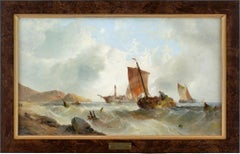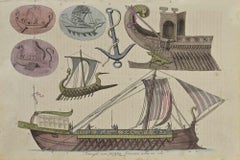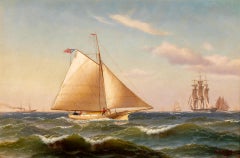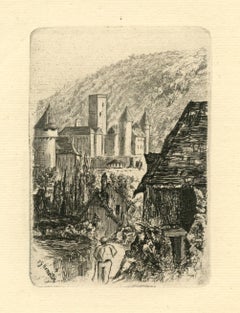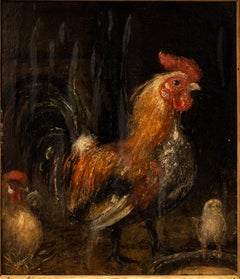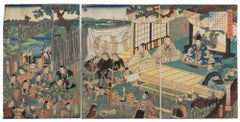1860s Art
to
75
879
180
58
42
32
Overall Width
to
Overall Height
to
7,478
21,068
160,029
233,310
1,940
2,227
4,768
6,392
5,827
14,942
20,265
25,489
17,766
13,637
5,305
732
51
30
6
3
1
646
511
5
861
441
335
249
232
197
138
94
71
65
55
52
49
49
47
46
46
40
38
37
652
205
189
155
82
31
11
10
6
6
195
751
689
248
Period: 1860s
George Clarkson Stanfield (Attributed), Shipwreck
Located in Cheltenham, GB
This mid-19th-century oil painting, attributed to English artist George Clarkson Stanfield (1826-1878), depicts a small vessel approaching a shipwreck, close to the coast. Stanfield ...
Category
Victorian 1860s Art
Materials
Oil, Canvas
Ancient Ships - Lithograph - 1862
Located in Roma, IT
Ancient Ships is a lithograph on paper realized in 1862.
The artwork belongs to the Suite Uses and customs of all the peoples of the universe: " History of the government, of the la...
Category
Modern 1860s Art
Materials
Lithograph
A Day's Sail in New England
Located in Costa Mesa, CA
An able sailor guides a fine sloop through the choppy waters of a busy American port in this work by Dutch-American artist Maurtiz DeHaas. Given the sailor's hat, what appears to be ...
Category
Realist 1860s Art
Materials
Canvas, Oil
"The Towers of Autun" original etching
Located in Henderson, NV
Medium: original etching. This impression on laid paper was printed in London in 1868 for the rare first volume of Philip Gilbert Hamerton's "Etching and Etchers". In addition to bei...
Category
1860s Art
Materials
Etching
"Bantam Rooster w/Hen and Chick" by Matthieu Theeuwes van Ginneken (1811-1888)
Located in SANTA FE, NM
"Bantam Rooster w/Hen and Chick"
Matthieu Theeuwes van Ginneken (1811-1888)
Oil on canvas mounted on wood panel
11 x 9 1/2 (18 x 16 1/2 x 3 inches frame) inches
Matthieu Theeuwes v...
Category
Realist 1860s Art
Materials
Canvas, Oil, Wood Panel
Gathering Scene - Woodcut by Utagawa Kuniyoshi - 1860 ca
Located in Roma, IT
Rare tryptich. Woodcut print nishike-e in loose sheets.
Utagawa Yoshikazu was a pupil of Utagawa Kuniyoshi and was active until around 1870. He is remembered for images of battles,...
Category
Modern 1860s Art
Materials
Woodcut
Ancient Ships - Lithograph - 1862
Located in Roma, IT
Ancient Ships is a lithograph on paper realized in 1862.
The artwork belongs to the Suite Uses and customs of all the peoples of the universe: " History of the government, of the la...
Category
Modern 1860s Art
Materials
Lithograph
Courtesans at Yoshiwara Edomachi - Figurative Japanese Woodblock Print on Paper
Located in Soquel, CA
Courtesan at Yoshiwara Edomachi - Figurative Japanese Woodblock Print on Paper
Full color woodcut print of two women in elaborate gowns by Utagawa Yoshiiku (Ochiai Yoshiiku) (Japanese, 1833-1904). Two women are dressed in colorful robes with crossed arms. They are underneath a plum blossom tree in bloom, at night. In the background there is a building with many rooms. Valuable polychrome woodblock print of vertical large oban (大判) format made by Utagawa Yoshiiku (歌川芳幾), the famous artist also known as Ochiai Yoshiiku (落合芳幾), and depicting the courtesan Shizuka (しづか), of the house of pleasure Matsumotoro (松本楼), together with her young kamuro (禿) assistant. The couple is escorted by a kanabohiki (金棒引き) watchman holding a lantern and a metal rod with rings to make noise and alert the crowd.
The work, produced in August 1869 by the publisher Tsunajima Kamekichi (綱島亀吉), is taken from the “Twelve Months of Yoshiwara” (よし原十二ヶ月のうち), an elegant series of prints dedicated to the famous red light district of Edo (江戸), and is paired with the “month of leaves” Hazuki (葉月), that is August.
Ochiai Yoshiiku (Japanese, 1833-1904) was an ukiyo-e artist from the end of the Edo Period to the Meiji Period. He has created works which are essential to the history of ukiyo-e, such as“Twenty-eight Famous Murders with Verse”, a series of chimidoro-e (bloody paintings) which Yoshiiku and Tsukioka Yoshitoshi collaborated together, and “Shimbun (newspaper) Nishiki-e” that illustrated Meiji news articles with ukiyo-e.
Born the son of teahouse proprietor Asakusa Tamichi in 1833, Yoshiiku became a student of ukiyo-e artist Utagawa Kuniyoshi toward the end of the 1840s. His earliest known work dates to 1852 when he provided the backgrounds to some actor prints by his master.
Yoshiiku's earliest works were portraits of actors (yakusha-e), beauties (bijin-ga), and warriors (musha-e). He later followed Kuniyoshi into making satirical and humorous pieces, and became the leading name in the field after Kuniyosh's death in 1861. He illustrated the Tokyo Nichi Nichi...
Category
Impressionist 1860s Art
Materials
Paper, Ink, Woodcut
Portrait of a Gleaner - British Victorian art harvest portrait oil painting
By James John Hill
Located in Hagley, England
This absolutely lovely British Victorian oil painting is by noted Birmingham born artist James John Hill and has some excellent provenance below. The painting actually stayed in Birmingham for many years, hanging in Heathfield Hall, the former residence of inventor and engineer James Watt, but owned at that time by Thomas Pemberton. It then moved to Berwick House in Shropshire. Entitled The Gleaner and painted in1863, it is a charming half length portrait of a young woman with a sheaf of wheat under her arm. She is stood beneath trees and the wheat field is beyond. She is dressed in a lovely pink garment and wearing a brown felt hat, to shade her face from the sun, her dark hair cascading down her shoulder, The hat is decorated with a poppy. The soft tones and sympathetic rendering of the young woman make this a stunning 19th century oil painting with excellent provenance.
The painting is housed in its original gilt frame with a beautiful oak leaf motif.
Signed and dated 1863 lower left.
Provenance. Thomas Pemberton, Heathfield Hall, Handsworth, Birmingham.
(Heathfield Hall was the former residence of the inventor and engineer James Watt. Following his death the house had several occupiers including local luminaries Thomas Pemberton and George Tangye).
His sale, Christie's, 30 April 1874, lot 95 (69gns to James Watson) Berwick House, Shropshire.
(James Watson (1817-1895) was an English merchant, dairy herdsman and Conservative politician who sat in the House of Commons from 1885 to 1892)
Condition. Oil on canvas, 34 inches by 28 inches unframed, in good condition.
Frame. Housed in its original gilt frame with oak leaf motif, 42 inches by 36 inches and in good condition.
James John Hill RBA (1811 – 27 January 1882), known also by his alias J. J. Hill, was an English landscape and portrait painter, known for his many rustic paintings and portraits of Lady Burdett-Coutts. James John Hill was born sometime in 1811 in Broad Street, Birmingham to Daniel Hill, plater, and Elizabeth Rowlinson, the daughter of a brass founder. He was educated at Hazelwood School, a school founded by the educational reformer Rowland Hill...
Category
Victorian 1860s Art
Materials
Oil
$35,384 Sale Price
20% Off
LAST MOMENTS OF PRESIDENT LINCOLN
Located in Santa Monica, CA
J. F. BUFFORD PUBLISHER and PRINTER
LAST MOMENTS OF PRESIDENT LINCOLN, April 15, 1865
Lithograph, very good impression. The 2 lower publishing lines ...
Category
American Realist 1860s Art
Materials
Lithograph
Gustave de Jonghe, "An Afternoon Visit, " original oil painting
Located in Chatsworth, CA
Gustave de Jonghe
An Afternoon Visit
Oil on panel
Image Size: 32.8 x 25 inches
Framed Dimensions: 41.7 x 33.5
Hand signed in lower left corner
Category
Romantic 1860s Art
Materials
Oil
Kabuki - Woodcut by Utagawa Kunisada II - 1862
Located in Roma, IT
Kabuki is an original artwork realized in 1862 by Utagawa Kunisada II (1823-1880).
Boatman with elegant passenger in snowy landscape.
Sign: Kochoro Kuni...
Category
Modern 1860s Art
Materials
Woodcut
Victorian 19th century English sailing yacht off the English coast
Located in Woodbury, CT
English 19th century Victorian Sailing scene, with fishing vessels off of a landscape.
Outstanding Victorian marine scene of a yacht at sail possible in the English Channel. Knell w...
Category
Victorian 1860s Art
Materials
Oil, Board
Pair of Fruit Still Lifes, Sarah Miriam Peale, Cherries and Raspberries Basket
Located in New York, NY
A pair of still lifes:
Sarah Miriam Peale
Cherries, circa 1860
Oil on canvas
12 x 10 inches
Provenance:
Kennedy Galleries, New York
Private Collection (acquired from the above in 1966)
Exhibited:
Baltimore, Maryland, Peale Museum, Miss Sarah Miriam Peale: 1800-1885, Portraits and Still Life, 1967, no. 42, p. 17, illustrated.
Philadelphia, Philadelphia Museum of Art, The Peale Family: Creation of an American Legacy, 1770-1870, 1996-97, pl. 61, p. 97, illustrated; this exhibition later traveled to Washington, D.C., National Portrait Gallery; Washington, D.C., Corcoran Gallery of Art; San Francisco, M.H. de Young Memorial Memorial Museum.
Sarah Miriam Peale
Basket with Berries, circa 1860
Oil on canvas
12 x 10 inches
Provenance:
Kennedy Galleries, New York
Private Collection (acquired from the above in 1966)
Exhibited:
Baltimore, Maryland, Miss Sarah Miriam Peale: 1800-1885, Portraits and Still Life, 1967, no. 43, p. 34, illustrated.
Philadelphia, Philadelphia Museum of Art, The Peale Family: Creation of an American Legacy, 1770-1870, 1996-97, pl. 125, pp. 245-46, illustrated; this exhibition later traveled to Washington, D.C., National Portrait Gallery; Washington, D.C., Corcoran Gallery of Art; San Francisco, M.H. de Young Memorial Memorial Museum.
One of the many artist descendants of Charles Willson...
Category
1860s Art
Materials
Canvas, Oil
Pierre Jules Mene Bronze, "Chien Braque a La Feuille"
Located in Dallas, TX
Pierre Jules Mene (French, 1810-1879)
Chien Braque a la Feuille
Bronze with brown patina
9.5 inches (24 cm) long
5 inches (12.7 cm) high
Inscribed on base: PJ Mene
Condition: ...
Category
1860s Art
Materials
Bronze
19th Century Original Scottish Loch Painting in the style of Alexander Nasmyth
Located in Soquel, CA
Mid 19th Century Original Oil Painting of Fishing on Scottish Loch in the Style of Alexander Nasmyth
Gorgeous 19th Century landscape painting of a Scottish loch with fisherman and castle ruins in the style of Alexander Nasmyth (Scottish, 1758 - 1840). This painting features the rough-hewned nature of Scotland's landscape while juxtaposing the peacefulness of a fisherman casting his line into the loch. Adding interest is the castle ruins on the cliff's edge with a sailboat beneath. There is something new to see with each viewing of this picture.
Signed: Illegible monogram lower left corner. (See image)
Framed: Presented in rustic giltwood frame of the period.
Condition: Good
Canvas size: 18"H x 24"W.
Framed Size: 22"H x 28"W x 3"D
Alexander Nasmyth was a painter, illustrator, landscape gardener and engineer. Alexander Nasmyth's style appears to have been molded principally on that of Claude Lorrain in arrangement, color and mood, and on Jacob van Ruysdael...
Category
Impressionist 1860s Art
Materials
Canvas, Oil, Stretcher Bars
$2,800 Sale Price
20% Off
Uses and Customs - Various Religion Orders - Lithograph - 1862
Located in Roma, IT
Uses and Customs - Various Religion Orders is a lithograph on paper realized in 1862.
The artwork belongs to the Suite Uses and customs of all the peoples of the universe: " History...
Category
Modern 1860s Art
Materials
Lithograph
Uses and Customs - Jupiter and Juno - Lithograph - 1862
Located in Roma, IT
Uses and Customs -Jupiter and Juno is a lithograph on paper realized in 1862.
The artwork belongs to the Suite Uses and customs of all the peoples of the universe: " History of the ...
Category
Modern 1860s Art
Materials
Lithograph
Dance called the Candiotta - Lithograph - 1862
Located in Roma, IT
Dance called the Candiotta is a lithograph on paper realized in 1862.
The artwork belongs to the Suite Uses and customs of all the peoples of the universe: " History of the governme...
Category
Modern 1860s Art
Materials
Lithograph
A Governor’s Mansion - Countryside Couple - Original Watercolor on Paper 1860s
Located in Soquel, CA
A Governor’s Mansion - Countryside Couple - Original Watercolor on Paper 1860s
Governor’s Mansion during the Civil Water. A watercolor painting depicting horse carriages and disting...
Category
American Impressionist 1860s Art
Materials
Paper, Watercolor
$2,000 Sale Price
20% Off
Jean-Achille Benouville (1815-1891) Rome, View of the Forum, drawing
Located in Paris, FR
Jean-Achille Benouville (1815-1891)
Rome, View of the Forum,
pencil on paper
28.5 x 37.5 cm
framed 38.5 x 47.5 cm
This drawing is characteristic of Romantic artists who, like Coro...
Category
Romantic 1860s Art
Materials
Carbon Pencil
Ex Voto; Miraculous Intervention of a Difficult Pregnacy, 19th Century Retablo
Located in Denver, CO
This authentic 19th-century Mexican ex-voto is a powerful testament to faith and survival, painted in oil on tin with ink circa 1869 by an anonymous Mexican artist. It is elegantly displayed in a custom, hand-carved frame enhancing its historical and artistic significance. The ex-voto itself measures 6 ½ x 9 ¾ inches, while the outer frame spans 14 ¼ x 17 ½ inches, making it a compelling piece for collectors of religious folk art.
A Miraculous Healing – A Story of Devotion
The heartfelt inscription tells the story of Mrs. Dia Anacleto Rodriguez, who, in 1860, faced a life-threatening childbirth with little hope of survival. In desperation, her husband, Mr. Epimenio Manzano, turned to Santo Niño de Atocha...
Category
Folk Art 1860s Art
Materials
Metal
The Shepherd, English Victorian 19th Century Egg Tempera
Located in London, GB
Sir William Blake Richmond KCB, RA, PPRBSA
1842 - 1921
The Shepherd
Egg tempera on wooden panel, signed with initials bottom left
Image size: 8 ¼ x 5 ½ inches
Period gilt oak frame
A newly discovered work by the artist.
Sir William Blake Richmond KCB, RA, PPRBSA was an English portrait painter, sculptor and a designer of stained glass and mosaic. He is best known for his portrait work and decorative mosaics in St Paul's Cathedral in London.
He was the son of the portraitist George Richmond RA and studied at the Royal Academy Schools in the early 1860s. Influenced by his father and by Sir John Everett Millais, he is best known for his mosaic decorations below the dome and in the apse of St Paul's Cathedral in London.
His father, George Richmond, was one of 'the Ancients' who were a group of artists who formed around the visionary artist and poet William Blake. Samuel Palmer was an other of the ancients and a close friend of the family.
Our painting could have been inspired by George Richmond’s engraving 'The Shepherd', 1827, but in our panel the shepherd is turned round facing away, and is playing a flute instead of resting on a staff. But the sheep and other elements are there.
It is also suggestive of Welby Sherman's engraving after Samuel Palmer of the same name and date, but here the shepherd is sitting but like ours turned away. William Blake's is an altogether happier image given the figure is playing to his sheep.
Our painting is playing with some of the same ideas and feels like the same sort of period, and the ‘fresco’ like chalk ground is interesting, as is the pen and ink finishing on the tempera. All three are strongly influenced by Blake's illustrations to Thornton's 'Virgil'. The shepherd and his flock are clearly based on Thenot and his sheep in the Frontispiece to Thornton.
Blake Richmond wrote:"If there be the least value in my pictures, it is due to such lovely early impressions derived from the sweet poetic work of many of my father's contemporaries, Calvert, Blake and others, whose shadows are substance still to me" [Sir William Blake Richmond, letter to his father, 50 years after the death of William Blake, from Stirling op. cit p. 28].
Richmond was given private art lessons by John Ruskin before attending the Royal Academy for three years. After that he spent a number of years in Italy, where an encounter with a shepherd called Beppino, 'a splendid speciman of a Sabine Shepherd', could also have gave him the inspiration for the painting we show here. Richmond recalls how he met Beppino on the hillside, and was invited to share the shade of the shepherd's capanna, a wooden hut. 'What a place! In an instant of time I was back into the age of kings, and I knew Romulus had lived and am sure that he lived in a hut exactly like this one'.
That night Richmond dined at Beppino's hut 'on roast kid, hard bread dipped in Roman wine, goat's cream and white ricotta'. The shepherd had such an impression on Richmond that he sought him out on a return visit to Italy some years later, but was saddened to hear that Beppino 'had joined his fore-fathers in the shades'.
He was moved to write the following, which perfectly expresses the mood of this painting and his tribute to a fleeting companion:
'Little events of this kind unite past times with present, create and emphasis continuity of human instincts, which seem to defy time and make travel so intensely interesting and invigorating to a citizen of this world. One need not go to the palace, far otherwise, or to cities and towns to discover the kernal of enduring civilisations. One finds it, if one wills to do so, in the backbone of the world, an ancient peasantry who have watched and still watch the progress of the stars'.
Richmond was influential in the early stages of the Arts and Crafts Movement in his selection of bold colours and materials for the mosaics in St. Paul's Cathedral and in his collaboration with James Powell and Sons...
Category
Victorian 1860s Art
Materials
Ink, Egg Tempera
“ Boys Bird Nesting”
Located in Warren, NJ
Oil on canvas
Property from a Southampton Estate
Sotheby's, June 13, 1985
Measurements
image size: 38 by 49 1/2 inches; overall: 49 by 60 1/2 inches
Painting has been restore...
Category
1860s Art
Materials
Oil
Portrait of a Spanish fruit seller
Located in Douglas, Isle of Man
Thomas Brooks 1819- 1891, was an English painter who was born in Kingston upon Hull, his works were deemed typical of the 19th Century depicting genre scenes of the times, including ...
Category
1860s Art
Materials
Canvas, Oil
Uses and Customs - Valachie - Lithograph - 1862
Located in Roma, IT
Uses and Customs - Valachie is a lithograph on paper realized in 1862.
The artwork belongs to the Suite Uses and customs of all the peoples of the universe: " History of the governm...
Category
Modern 1860s Art
Materials
Lithograph
Uses and Customs - View of the Lake of Como taken from... - Lithograph - 1862
Located in Roma, IT
Uses and Customs - View of the Lake of Como taken from Bellagio is a lithograph on paper realized in 1862.
The artwork belongs to the Suite Uses and customs of all the peoples of th...
Category
Modern 1860s Art
Materials
Lithograph
Tal Para Qual - Etching by Francisco Goya - 1868
Located in Roma, IT
Tal para Qual is an original artwork realized by the Spanish artist Francisco Goya and published for the first time in 1799.
Original etching on paper.
The plate is part of the Thi...
Category
Old Masters 1860s Art
Materials
Etching, Aquatint
Uses and Customs - Como Cathedral - Lithograph - 1862
Located in Roma, IT
Uses and Customs - Como Cathedral is a lithograph on paper realized in 1862.
The artwork belongs to the Suite Uses and customs of all the peoples of the universe: " History of the g...
Category
Modern 1860s Art
Materials
Lithograph
Uses and Customs - Map of Churches - Lithograph - 1862
Located in Roma, IT
Uses and Customs - Map of Churches is a lithograph on paper realized in 1862.
The artwork belongs to the Suite Uses and customs of all the peoples of the universe: " History of the ...
Category
Modern 1860s Art
Materials
Lithograph
Portrait of a Young Boy With Hat, Possibly Painted by Gustaf Brandelius
Located in Stockholm, SE
Unknown Artist, Possibly Gustaf Brandelius (1833-1884)
Portrait of a Young Boy With Hat
oil on tree panel
painted c.1850-70
panel 9.05 x 5.90 inches ...
Category
1860s Art
Materials
Oil, Wood Panel
Cubist Figures
Located in Los Angeles, CA
IRVING GEORGE LEHMAN
"CUBIST FIURES'
OIL ON PANEL, SIGNED
RUSSIAN-AMERICAN, C.1960
23.5 X 25.5 INCHES
FRAMED 29.5 X 32.5 INCHES
Irving George Lehman
1900-1983
Born in Kiev, R...
Category
Cubist 1860s Art
Materials
Oil, Panel
$1,687 Sale Price
25% Off
Venice, The grand canal and Rialto Bridge - XIX c., Oil paint, 71x100 cm.
Located in Nice, FR
Oil on canvas, not signed. Venitian School Mid XIX century. Framed, dim: 94x125 cm.
Category
Italian School 1860s Art
Materials
Oil
Balok Dancers - Lithograph - 1862
Located in Roma, IT
Customs -Balok Dancers is a Hand-colored lithograph on paper realized in 1862.
Titled on the lower.
The artwork belongs to the Suite Uses and customs of all the peoples of the univ...
Category
Modern 1860s Art
Materials
Lithograph
French still life 19th roses vase BRUYAS
Located in PARIS, FR
Marc BRUYAS
Lyon, 1821 - 1896
Oil on canvas
32 x 23 cm (42 x 33 cm with frame)
Signed and dated lower left “Bruyas / December 1863”
Beautiful carved and gilded wooden frame from the...
Category
Romantic 1860s Art
Materials
Oil
$2,643 Sale Price
20% Off
Customs - Persian Deities - Lithograph - 1862
Located in Roma, IT
Customs - Persian Deities is a lithograph on paper realized in 1862.
Titled on the lower.
The artwork belongs to the Suite Uses and customs of all the peoples of the universe: " Hi...
Category
Modern 1860s Art
Materials
Lithograph
De que Sirvé una Taza? - Etching by Francisco Goya - 1863
Located in Roma, IT
Di que sirvé una taza? is an original artwork realized by the great Spanish artist Francisco Goya in 1810.
Original Etching on paper.
The artwork belongs to the famous series "Lo...
Category
Old Masters 1860s Art
Materials
Etching, Aquatint
Kabukie - The Province of Rokuok - Woodcut by Utagawa Kunikazu - 1862
By Utagawa Kunikazu
Located in Roma, IT
Kabukie - The Province of Rokuoku is an original artwork realized in 1862 by Utagawa Kunikazu (1830 - 1919)
Chuban.
From the series "Dai Nippon rokuju of Rikuoku" (60 provinces of Glorious Japan), The Province of Rokuoku.
Meeting of the two rivals in the forest at night, Tanigoro with sumo apron and fan with the national colours.
Signed: Kunikazu.
Good impression, backed, glued at corners, oxidation, centrefold, a little bit rubbed.
Utagawa Kunikazu (1830 - 1919) was a printmaker from Osaka. He had a famous teacher, the ukiyo-e artist Kunisada Utagawa...
Category
Modern 1860s Art
Materials
Woodcut
Susanna
Located in PARIS, FR
Susanna
by Albert-Ernest Carrier-Belleuse (1824-1887)
Bronze sculpture with nuanced brown patina
signed to the side " A. Carrier "
old period cast
France
circa 1860
height 62 cm
...
Category
French School 1860s Art
Materials
Bronze
Three Terrier Dogs by a Rabbit Hole. Oil on Canvas by George Armfield
Located in St. Albans, GB
GEORGE (SMITH) ARMFIELD
This is a classic example of George Armfield's paintings with terriers.
Picture Size: 10 x 14" (25 x 35cm)
Outside Frame Size: 16 x 20" (40 x 50cm)
Exhibitio...
Category
Victorian 1860s Art
Materials
Oil
Uses and Customs - Republic of Cisalpina - Lithograph - 1862
Located in Roma, IT
Uses and Customs - Republic of Cisalpina is a lithograph on paper realized in 1862.
The artwork belongs to the Suite Uses and customs of all the peoples of the universe: " History o...
Category
Modern 1860s Art
Materials
Lithograph
Parisienne - Original Etching by Fernand Desmoulin - 1886
Located in Roma, IT
Pariesienne is an original artwork realized by Fernand Desmoulin in 1886. Etching on paper.
Titled on the lower central margin; "Supplement de Paris-Noel" at the bottom; "L. Eudes ...
Category
1860s Art
Materials
Etching
“Checco vuol un Soldo” (Checco wants a Penny)
Located in Southampton, NY
Original oil on wooden panel painting of a young child begging for a coin. The painting is attributed to the hand of Leopoldo Dumini. Circa 1865...
Category
Academic 1860s Art
Materials
Wood Panel, Oil
$2,240 Sale Price
20% Off
Kinderfest (Wie die Alten sungen, so zwitschern die Jungen)
Located in Milwaukee, WI
Framed 46 x 57.50 in13
Printed by L. Angerer. Engraved by Paul Sigmund Habelmann after the original oil painting by Ludwig Knaus.
The inscription "Wie die Alten sungen, so zwitschern...
Category
1860s Art
Materials
Engraving
Uses and Customs - Underground Church of Saint Nicholas... - Lithograph - 1862
Located in Roma, IT
Uses and Customs - Underground Church of Saint Nicholas of Bari in Naples is a lithograph on paper realized in 1862.
The artwork belongs to the Suite Uses and customs of all the peo...
Category
Modern 1860s Art
Materials
Lithograph
Costumes of the 17th century - Lithograph - 1862
Located in Roma, IT
Costumes of the 17th century is a lithograph on paper realized in 1862.
The artwork belongs to the Suite Uses and customs of all the peoples of the universe: " History of the govern...
Category
Modern 1860s Art
Materials
Lithograph
Uses and Customs - Virgil's Tomb in Naples - Lithograph - 1862
Located in Roma, IT
Uses and Customs - Virgil's Tomb in Naples is a lithograph on paper realized in 1862.
The artwork belongs to the Suite Uses and customs of all the peoples of the universe: " History...
Category
Modern 1860s Art
Materials
Lithograph
Uses and Customs - Map of Churches in Ravenna - Lithograph - 1862
Located in Roma, IT
Uses and Customs - Map of Churches in Ravenna is a lithograph on paper realized in 1862.
The artwork belongs to the Suite Uses and customs of all the peoples of the universe: " Hist...
Category
Modern 1860s Art
Materials
Lithograph
View of the Campo di Marte, Venice
Located in Long Island City, NY
Artist: George Clarkson Stanfield, English (1828 - 1878)
Title: View of the Campo di Marte, Venice
Year: circa 1864
Medium: Oil on Canvas, signed l.r.
Size: 14.5 in. x 23.5 in. (36.8...
Category
Impressionist 1860s Art
Materials
Canvas, Oil
Portrait of Coraline - Belgian women
Located in BELEYMAS, FR
Auguste Adolphe CHAUVIN
(Liege, 1810 – Liege 1884)
Portrait of Coraline
Oil on canvas
Signed and dated lower right
91 x 68cm
1868
Auguste Adolphe Chauvin, born in Liège on October 2...
Category
French School 1860s Art
Materials
Canvas, Oil
"America, " Edmund Coates, Hudson River School, Civil War, Skaters Sled Landscape
By Edmund C. Coates
Located in New York, NY
Edmund Coates (1816 - 1871)
America, 1861
Oil on canvas
30 x 40 inches
Provenance:
Kennedy Galleries, New York
Private Collection
This 1861 painting shows deep symbolism with a sled reading "America" slipping down a hill.
A versatile nineteenth-century painter, Edmund C. Coates created landscapes, seascapes, portraits, and history paintings. Born in England, Coates spent his adult life in New York City, where he was a frequent exhibitor at the National Academy of Design. Working in the style of the Hudson River School, Coates produced beautiful, idealized images of the lakes and mountains of the Hudson River Valley and the White Mountains of New Hampshire, as well as romantic visions of ancient Italian ruins. He was closer in dates to the second generation of the Hudson River school, which included Frederic Edwin...
Category
Hudson River School 1860s Art
Materials
Canvas, Oil
Kabuki - Woodcut by Sawamura Tanosuke - 1862
Located in Roma, IT
Kabuki is an original artwork realized in 1862.
Breast portrait of the actor Sawamura Tanosuke in front of a dark blue background, as Kanehira's daughter, in the inset portrait of B...
Category
Modern 1860s Art
Materials
Woodcut
Eugène Cicéri (1813-1890) The Mill, original signed drawing
By Eugène Ciceri
Located in Paris, FR
Eugène Cicéri (1813 - 1890)
The Mill
Signed lower right
Monogrammed AE, probably a collector's mark as it appears on numerous drawings by Cicéri
30.5 x 22.5 cm
In good condition : ...
Category
Romantic 1860s Art
Materials
Pencil
Dante and Virgil on the Edge of the Styx
Located in Pasadena, CA
Louis-Camille d'Olivier,
A painter of history and portraits, he returned to the Ecole des Beaux-Arts in 1850 and appeared at the Salon de Paris between ...
Category
Romantic 1860s Art
Materials
Oil
$4,800 Sale Price
20% Off
Temple of Neptune Pesto - Lithograph - 1862
Located in Roma, IT
Uses and Customs - Temple of Neptune Pesto is a lithograph on paper realized in 1862.
The artwork belongs to the Suite Uses and customs of all the peoples of the universe: " History...
Category
Modern 1860s Art
Materials
Lithograph
Persian Cloth in 19th Century- Lithograph - 1862
Located in Roma, IT
Persian Cloth in 19th Century is a Hand-colored lithograph on paper realized in 1862.
The artwork belongs to the Suite Uses and customs of all the peoples of the universe: " History...
Category
Modern 1860s Art
Materials
Lithograph
View of an Aquaduct and a Castle. Richmond, Yorkshire
Located in St. Albans, GB
Edward Niemann Junior
A superb example of Edward Niemann's work. The piece is housed in its original detail and is of a quality that would be more akin...
Category
Victorian 1860s Art
Materials
Oil
Talleyrand - Etching by A. Ethiou - 1837
Located in Roma, IT
Talleyrand is an original Etching realized by A. Ethiou in 1837.
Good conditions.
The artwork is realized in a well-balanced composition. the artwork and belongs to the suite suite...
Category
Modern 1860s Art
Materials
Lithograph
Gynoecium - Lithograph - 1862
Located in Roma, IT
Gynoecium is a lithograph on paper realized in 1862.
The artwork belongs to the Suite Uses and customs of all the peoples of the universe: " History of the government, of the laws, ...
Category
Modern 1860s Art
Materials
Lithograph
Kabuki - Woodcut Print by Utagawa Kunisada - 1864
Located in Roma, IT
Kabuki is an original artwork realized in 1864 by Utagawa Kunisada (1786-1865).
Breast portrait of the actor Sawamura Toshi in front of a dark blue background, he's wearing a lion dance costume. In the inset portrait of Kataoka Nizaemon with a feather costume.
Signed: Oshio Toyokuni ga (77 Toyokuni).
Publisher: Ebiya Rinnosuke in Horie. Censorship: Aratame. Wood engraver: Matsushima Masakichi.
Excellent impression with visible wood grain and baren print lines...
Category
Modern 1860s Art
Materials
Woodcut
